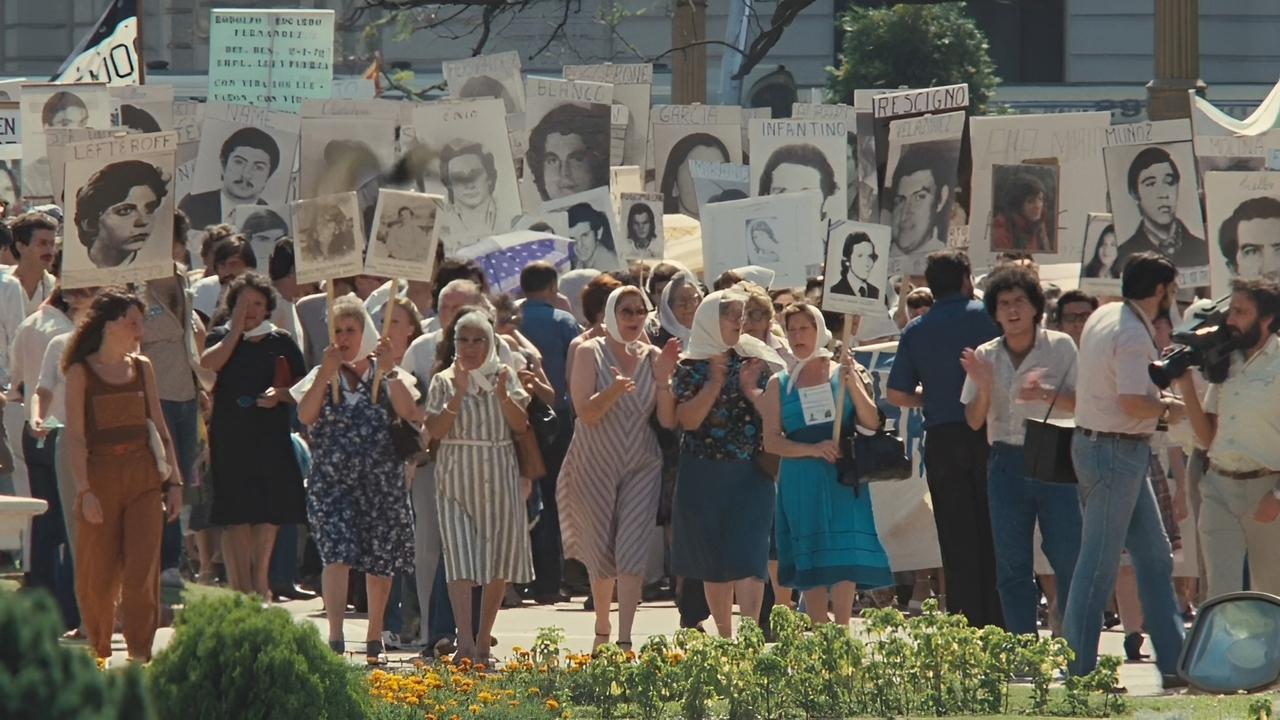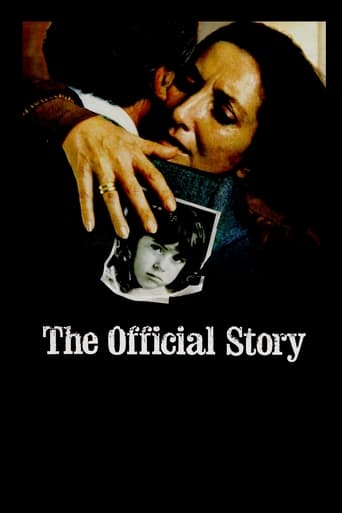

People are voting emotionally.
... View MoreClose shines in drama with strong language, adult themes.
... View MoreThere's a more than satisfactory amount of boom-boom in the movie's trim running time.
... View MoreThe movie really just wants to entertain people.
... View MoreA searing political exposé situated in the immediate aftermath of Argentina's Dirty War (1976- 1983), director Luis Puenzo's second feature THE OFFICIAL STORY became the first Argentinian movie to snatch Oscar's BEST FOREIGN LANGUAGE PICTURE laurels. In 1983, the seemingly perfect life of a middle-class high-school history teacher Alicia Ibáñez (Aleandro) starts to crack when she begins to suspect the birth parents of her adopted daughter Gaby (Castro, an elfin darling), now 5-year-old, might be victims of political persecutions during the military dictatorship. She is determined to find out the truth and inexorably clashes with her husband Roberto (Alterio), who is a well-off government representative and might be in the knowing from the very start. Puenzo and his co-screenwriter Aída Bortnik import a limpid script to set Alicia to embark on a late-but-better-than-never realization of her country's buried horror which implausibly has been eluded by her until that point, as one of her colleagues Benítez (Contreras) jests that nothing is more gratifying than a guilty bourgeois woman. What makes Alicia tick is the return of her best friend Ana (Villafañe) from abroad, during an escalatingly poignant two-hander from the two magnificent actresses, Ana confesses to her that she was subjected to torture by the secret police (she is an associate of a subversive) and was forced into exile. Ana's account jolts Alicia into facing up with that troubling question, at the same time, a subplot pertains to the rebellious polemic of Alicia's students (atrociously played by actors much maturer than high schoolers) also vouch for the progress on her conscience. When she finally meets Sara (Ruíz), possibly Gaby's biological grandmother, she bestirs herself with a final attempt to reason with her intransigent husband. Apart from the film's polemical angle in cashing in on a topical powder keg, in retrospect, the film's more lingering sway is underlain by its less argumentative depiction of women's place in a typical patriarchal society, through our heroine, Alicia is an ordinary woman in every aspect, mostly hedged in her domestic remit, a mother and a wife, Roberto has never cared to ask anything about her job, as if it is just a hobbyhorse to keep her busy. During Roberto's apoplectic wrangle with his leftist father Jose (Battaglia) and brother Enrique (Arana), Alicia's total silence speaks volumes in that tableau vivant - women have no voice in politics (neither in religion, as glanced through Alicia's vain endeavor inside a confessional, belittled by a snotty man of God), they are subservient, ancillary and biddable, but, as a human being, every sane soul is endowed with the judgment of right and wrong, and Puenzo's sensible work pays the highest homage to that, which makes the ending incredibly uplifting albeit with such a small gesture, as it would happen in real life. Puenzo assembles an ace cast, Villafañe, Battaglia, Ruíz are all bankable scene-stealers, but no one can upstage Norma Aleandro's pyrotechnics, which oozes heartfelt nuance to countervail a melodramatic milieu Alicia is entangled with and staunchly refuses any trace of ham. On the other hand, Héctor Alterio embodies Roberto, a mouthpiece of the junta, with repulsion-inducing exertion as the sole villain in the film, an outstanding feat to accomplish out of a less well-rounded character. All in all, Puenzo's blunt cri-de-coeur is graced with a lyrical accompanying score and an encroaching camera-work as if it tries to delve as deep as possible into its characters' psyche, an engaging infotainment with humanity unflaggingly glistening in its nucleus.
... View MoreWell, I usually don't see much of the foreign language films but after viewing Oscars giving a special award to such great films, I almost got swept off at viewing few films. This one too was one of them where a viewer can't get delight in each scene after scene. But there might be impacts ringing to-and-fro after finishing the whole. The story is quite engaging related to societal issues waving around Argentinian people and their disappeared families. How would one react on losing someone close is what depicted unwaveringly. This was the movie which made me cry at certain scenes. Some dialogs even made me numb. The power of this film lies in placing ourselves into the place of characters of the film. It derives the feelings inside us for how would we react when we are placed into situation of losing a very important thing of our life. Undoubtedly, this movie is the one which shows human emotions on some very realistic aspects of life. This film has also played some beautiful strokes in the field of analyzing history of Argentina. And that is what makes the film to watch with top determination.
... View MoreThis movie is easily one of my favorite Spanish films. It is a powerful story of an awakening from ignorance and the pursuit the truth, not from one of the disappeared victims of the Dirty War that traumatized Argentina in the 1970's, but of a middle-class history teacher who unknowingly supports it. As the story unfolds, we learn more and more that those closest to her may have the most to hide, and we are made painfully aware that ignorance does not excuse us from our responsibilities to justice and humanity. The drama and mystery are thick, almost tangible, and will keep you enthralled until the last shocking, eerie moment.
... View MoreLuis Puenzo's 'La Historia Official' captures a moment in Argentine history from the perspective less common for it's home audience; the aristocracy. Inside the junta military (military rule) of Argentina from 1976-1983 there were many like Alecia Marnet, with their upper class stability and indifference to a rule that left them in power of their own destinies. Alecia is somewhat different in her work as a history teacher seemingly unaware of how history is written by the victors. Her subsequent change of heart parallels that of her country, without which change this film could never have made.There are plenty of compelling stories within 'La Historia Official' that sensitively portray the atrocities suffered by the Argentines at the hand of their own rulers. When Alecia is told of the uncharged detention and torture of her high school friend in a first hand account could hardly believe that such horrors could be committed by those who helped her family build a good life. She dismisses her students' news articles and pleads for peaceful renewal in the country, even threatening to expel them for questioning the official history accounts. Alecia at first reacts in denial to these challenges to authority in protection of herself from feeling guilt and shame for having benefited from others' suffering. It is entirely necessary for her to take the experience personally, through finding her daughter's true identity, for Alecia to accept and then come to terms with her own and her nation's true identity. This psychodrama is furthered by her own husband's opposition to the truth; his definition of success is motivated only when he is recognized with respect. As Alecia finds her husband's own family cannot respect his work, and she in turn can no longer respect him for his deceit, she in turn becomes one of the people before Argentina frees itself from its fascist rulers.There's much to love in any film made about the people like those who are making it. 'La Historia Official' may not represent anything distinctive technically from other films, but its story is a powerful tribute to its own country. The film however is entirely universal. Had the film taken place in fascist Spain or any other fascist ruled country, the only differences would probably be cultural and historical. Through Alecia we find the ability to learn the truth and rise in opposition within ourselves. 'La Historia Official' shows us the truth lay dormant within ourselves but should not be ignored for the sake of accepting the history we are told.
... View More